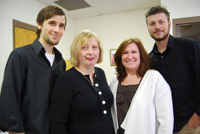Editorial
Front Page - Friday, January 7, 2011
Bridges Refugee and Sponsorship Services crosses land, sea
David Laprad
 Each year, the United States grants refugee status to 80,000 individuals who have been stripped of their rights in their native country. The staff at Bridges Refugee and Sponsorship Services in Chattanooga works with federal and state refugee agencies to resettle refugees from Iraq, Somalia and Sudan in the Scenic City.
- David Laprad
Each year, the United States grants refugee status to 80,000 individuals who have been stripped of their rights in their native country. The staff at Bridges Refugee and Sponsorship Services in Chattanooga works with federal and state refugee agencies to resettle refugees from Iraq, Somalia and Sudan in the Scenic City.
- David Laprad
The Golden Gate Bridge connects the city of San Francisco with the northern tip of the San Francisco peninsula. The Brooklyn Bridge joins the New York City boroughs of Manhattan and Brooklyn by spanning the East River. A bridge also connects Chattanooga with Iraq, Somalia and Sudan, but instead of allowing people to travel between two locations, it provides safe passage to people in danger of losing their lives.
Each year, the United States grants refugee status to 80,000 individuals who have been stripped of their rights in their native country, whether because of political turmoil, religious persecution, or some other reason. Many of them have languished in refugee camps for years. To return home would be to face possible death, so they choose to travel to a place where they have no relatives, friends, job, or even a basic understanding of how things work.
Marina Peshterianu, office coordinator at Bridges Refugee and Sponsorship Services, a resettlement agency in Chattanooga, loves to go to the airport to meet incoming refugees.
“It’s an exhilarating mo-ment. These people don’t know us, but they’re trusting us with their lives,” she says.
The road to that point has been long, and paved with interviews, medical screenings, security checks and paperwork. The regulations and criteria the refugees must meet are stringent. Once everything is in order, they’re given a loan for an airplane ticket, pack no more than two suitcases and leave.
Once the U.S. places a refugee in the care of Bridges, the organization oversees his or her integration into society. There are appointments to keep, English classes to take, employment to secure and a home to establish. The goal is to have a refugee self-sufficient within six moths, Peshterianu says.
While the U.S. does give refugees a small grant to help them get settled in an apartment, and volunteers help with transportation and general integration, program participants must secure employment on their own merit.
“There’s nothing in our laws and nothing between me and the human resources department of any company that gives a refugee special treatment. When they’re hired, it’s because they were the best candidate for the job,” Peshterianu says.
She opens a drawer to reveal dozens of folders containing the contact information for local manufacturing, hospitality, medical and food service companies. Although refugees gravitate toward positions in those industries, Peshterianu says there are no limits to where they can work or what they can accomplish.
“People who arrived over a year ago have become supervisors. A young client from Bosnia who worked in television for a year after college told me his dream was to be back doing what he was trained to do, but that he’d take anything. He’s now a creative director at PBS,” she says.
While Peshterianu, a Uk-rainian who resettled in the U.S., is passionate about helping refugees, she knows some people don’t share her enthusiasm, and criticize the U.S. government’s participation in a United Nations program they believe takes jobs from natural born citizens. Whenever someone levies criticism along those lines at her, she opens another draw and pulls out a stack of letters from people who don’t like what Bridges does.
“These letters remind me of why I do this. Someone has to advocate for people who are vulnerable. It’s human to feel angry when your husband doesn’t have a job and you can’t pay your bills, but this country stands on the idea that everyone is given a fair chance,” she says, adding that refugees arrive legally, with the blessing of the U.S. government.
Of the 80,000 refugees who came into the U.S. in 2009, about 1,500 came to Tennessee. Of those, 112 made their home in Chattanooga. Peshterianu says refugees, particularly those from Iraq, love the Scenic City.
“Most of our Iraqi refugees got caught up in the war, or provided support for our troops or the reconstruction effort. They love Chattanooga. The people here are hospitable and kind. And it’s easier to make a life here than in New York City. Goals are more achievable,” she says.
Although Peshterianu and her three staff members have helped hundreds of refugees, she says every case is memorable for a different reason.
“Some cases are memorable because the client achieved outstanding results. I remember children who were so malnourished when we went to the airport, I thought they’d never make it. So to see them driving to Bridges at 16 to show me their driver’s license is a thrill.
Other stories are memorable because they’re unbelievable, like the Sudanese woman who wanted to work in a nursing home so she could help older people. We go through six to eight months of intense relationship with our clients, so they are all memorable,” she says.
To learn more about Bridges, or to inquire about volunteer or sponsorship opportunities, call 423-954-1911.
|
|